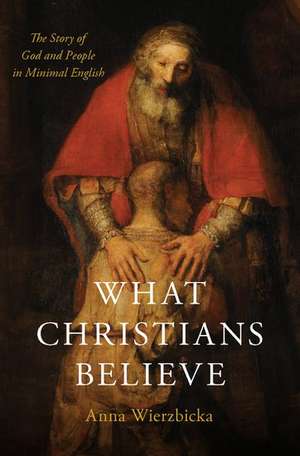What Christians Believe: The Story of God and People in Minimal English
Autor Anna Wierzbickaen Limba Engleză Hardback – 30 mai 2019
Preț: 204.00 lei
Preț vechi: 221.63 lei
-8% Nou
Puncte Express: 306
Preț estimativ în valută:
39.04€ • 40.51$ • 32.63£
39.04€ • 40.51$ • 32.63£
Carte tipărită la comandă
Livrare economică 04-10 martie
Preluare comenzi: 021 569.72.76
Specificații
ISBN-13: 9780190855284
ISBN-10: 0190855282
Pagini: 248
Dimensiuni: 239 x 155 x 33 mm
Greutate: 0.66 kg
Editura: Oxford University Press
Colecția OUP USA
Locul publicării:New York, United States
ISBN-10: 0190855282
Pagini: 248
Dimensiuni: 239 x 155 x 33 mm
Greutate: 0.66 kg
Editura: Oxford University Press
Colecția OUP USA
Locul publicării:New York, United States
Recenzii
A fascinating linguistic undertaking.
This book is a monumental yet winsome and profoundly erudite work. It is an absolute pleasure to read, and it will be of interest to a wide variety of practitioners, including translators, linguists, preachers, theologians, ordinary Christians, or just about anyone who might be curious to understand the Christian Story. The way Wierzbicka argues, she transcends cultures while being able to be embedded within them. The juxtaposition of consummate skill in semantic analysis, including sensitivity to semantic typology and cultural differences, combined with the depth of theological insight, is rare and has produced a unique and enduring book.
Anna Wierzbicka presents the Scriptures in a way that has never been done before -- in 'minimal English', 'words which have exact equivalents in nearly all languages'. It does not presume any familiarity with the Scriptures or the Christian story. It will be an invaluable addition to the spread of the faith in many languages.
Full of rich imagery and symbolism, religious varieties of language are some of the most demanding to interpret. There are local uses and meanings to explore, ancient traditions to address, and of course deep forms of practice attached to each. Anna Wierzbicka's use of her Natural Semantic Meta-language in What Christians Believe demonstrates a way of placing religious lessons into simple terms, easily accessible in any language. The reader is challenged to discern whether the afforded formulations aid in religious understanding. Many readers will benefit from this book, not least students of the Bible, anthropologists, communication scholars, linguists, and semanticists, among many others.
In this wonderful book, well-known linguist Anna Wierzbicka draws mainly on sixty-five words common to all languages to describe what Christians believe. The result overcomes the distortions arising from vernacular renditions to present Christianity in a universally accessible and startlingly refreshing light. Reading it is delightful and profoundly perspective-altering.
This book is recommended as an introduction to the tenets of Christianity or as an opportunity to reengage for those who would like to consider the core beliefs afresh. It will also appeal to readers interested in research on language and, in particular, efforts to find commonalities between languages.
This book is a monumental yet winsome and profoundly erudite work. It is an absolute pleasure to read, and it will be of interest to a wide variety of practitioners, including translators, linguists, preachers, theologians, ordinary Christians, or just about anyone who might be curious to understand the Christian Story. The way Wierzbicka argues, she transcends cultures while being able to be embedded within them. The juxtaposition of consummate skill in semantic analysis, including sensitivity to semantic typology and cultural differences, combined with the depth of theological insight, is rare and has produced a unique and enduring book.
Anna Wierzbicka presents the Scriptures in a way that has never been done before -- in 'minimal English', 'words which have exact equivalents in nearly all languages'. It does not presume any familiarity with the Scriptures or the Christian story. It will be an invaluable addition to the spread of the faith in many languages.
Full of rich imagery and symbolism, religious varieties of language are some of the most demanding to interpret. There are local uses and meanings to explore, ancient traditions to address, and of course deep forms of practice attached to each. Anna Wierzbicka's use of her Natural Semantic Meta-language in What Christians Believe demonstrates a way of placing religious lessons into simple terms, easily accessible in any language. The reader is challenged to discern whether the afforded formulations aid in religious understanding. Many readers will benefit from this book, not least students of the Bible, anthropologists, communication scholars, linguists, and semanticists, among many others.
In this wonderful book, well-known linguist Anna Wierzbicka draws mainly on sixty-five words common to all languages to describe what Christians believe. The result overcomes the distortions arising from vernacular renditions to present Christianity in a universally accessible and startlingly refreshing light. Reading it is delightful and profoundly perspective-altering.
This book is recommended as an introduction to the tenets of Christianity or as an opportunity to reengage for those who would like to consider the core beliefs afresh. It will also appeal to readers interested in research on language and, in particular, efforts to find commonalities between languages.
Notă biografică
Anna Wierzbicka is Professor Emerita at Australian National University, Canberra. Her work spans several disciplines, including linguistics, anthropology and religious studies.
